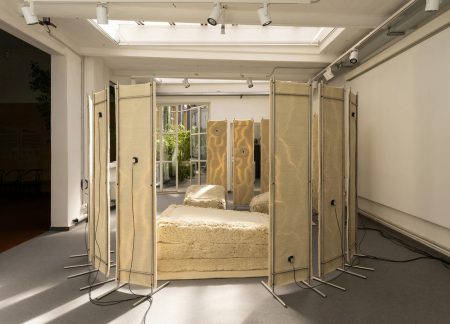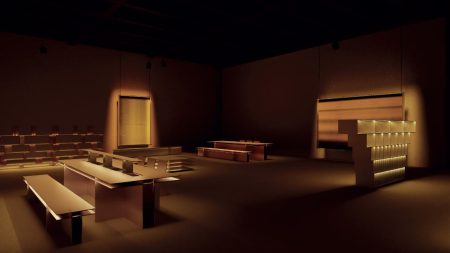Frankfurt RheinMain is taking bold steps toward becoming the World Design Capital (WDC) in 2026, and its preliminary programme, unveiled at the Ambiente Fair in Messe Frankfurt, offers a glimpse into an exciting and transformative vision. Under the theme “Design for Democracy. Atmospheres for a Better Life,” the initiative aims to showcase how design can serve as a powerful tool for fostering democratic values, improving quality of life, and creating a more inclusive and sustainable future. By collaborating with cultural institutions, universities, and businesses, Frankfurt RheinMain is positioning itself as a global hub of creativity and innovation. This ambitious effort is not just about design—it’s about using design as a catalyst for positive social change, bringing people together, and creating spaces that reflect the needs and aspirations of the community.
At the heart of WDC 2026 is the belief that design has the power to shape democratic societies. The programme is structured around seven key themes, each highlighting a different aspect of how design can contribute to a better world. The first theme, “Preserving Democratic Spaces,” focuses on creating and protecting public areas where people can come together, such as the GündiWest project, which provides a welcoming space for formerly homeless individuals, and the Kulturcampus Frankfurt redevelopment, which aims to create a vibrant cultural hub. These projects remind us that public spaces are not just physical locations but also symbols of democracy and community. By designing spaces that are accessible, inclusive, and meaningful, we can strengthen the fabric of our society.
Another theme, “Fostering Community Bonds,” emphasizes the importance of social inclusion and connection. Projects like the Kelkheim city festival and the Kiosk of Solidarity are designed to bring people together and support marginalized groups, reminding us that design is not just about aesthetics but also about building relationships. These initiatives show how design can create opportunities for dialogue, understanding, and mutual support, which are essential for a healthy democracy. By engaging communities in the design process, WDC 2026 is ensuring that everyone has a stake in shaping the future.
The theme “Experiencing Design Through the Senses” takes a more creative approach, exploring how design can engage our senses and inspire new ways of thinking. Projects like urban dance performances and the “A Step Ahead” exhibition at Mathildenhöhe Darmstadt invite people to experience design in a more immersive and personal way. This approach not only makes design more accessible but also encourages people to think about how design can influence their daily lives. By engaging the senses, WDC 2026 is creating spaces and experiences that inspire joy, curiosity, and a deeper appreciation for the role of design in shaping our world.
Innovation is another key focus of WDC 2026, with initiatives like the Bibliotheken digifit programme, which aims to modernize libraries across the region and enhance digital access. This theme, “Progressing Through Innovation,” highlights the importance of design in embracing new technologies and creating a more connected and equitable society. By leveraging design to address challenges like digital divide, WDC 2026 is ensuring that everyone can benefit from the opportunities of the digital age. This theme also underscores the importance of continuous learning and adaptation, as design plays a crucial role in driving progress and innovation.
The theme “Empowering the Next Generation” is particularly inspiring, as it focuses on engaging young people in design and equipping them with the skills and creativity they need to shape the future. Initiatives like Domäne S, which transforms underutilized urban spaces into creative hubs, provide students and young designers with hands-on opportunities to experiment, innovate, and make a real impact. By empowering the next generation, WDC 2026 is ensuring that design remains a powerful force for social progress and that the region continues to thrive as a hub of creativity and innovation.
In addition to these themes, WDC 2026 is bringing a series of exciting events to life across the region, designed to engage both local and international audiences. From the Design Month in August 2026, which will feature exhibitions and interactive design experiences, to the World Design Experience, a nine-day event showcasing global design talent, these events will celebrate the diversity and creativity of the design community. The World Design Street Festivals will transform neighborhoods into vibrant cultural playgrounds, while the World Design Policy Conference will bring together thought leaders to discuss the role of design in shaping policy. The WDC Pavilion, a mobile and sustainable exhibition space, will travel across the region, making design accessible to different communities. These events will not only celebrate design but also inspire people to think differently about the role of design in their lives.
Key stakeholders have expressed their enthusiasm for WDC 2026, highlighting its potential to transform the region and position Frankfurt RheinMain as a leader in creative, economic, and social innovation. City Councillor Dr. Ina Hartwig emphasized the importance of using design to reinforce democratic principles, especially in the face of global challenges. District Administrator Ulrich Krebs described the initiative as a “strategic investment in the region’s future,” urging businesses and communities to play an active role in its development. CEO Carolina Romahn and Chief Programme Officer Barbara Lersch highlighted the diverse range of projects shaping WDC 2026, expressing excitement about the programme’s potential to bring people together and inspire positive change.
The initiative is financially supported by the Hessian Ministry of Economic Affairs as part of the Innovation Promotion Hessen programme, with the City of Frankfurt and Kulturfonds Frankfurt RheinMain leading the implementation through Design FRM gGmbH. This investment underscores the region’s commitment to leveraging design as a driver of innovation and social progress. As WDC 2026 approaches, Frankfurt RheinMain is also looking beyond its borders, participating in international design festivals and exhibitions in cities like London, Vienna, and Eindhoven. These activities will not only showcase the region’s creativity but also foster global collaboration and exchange.
Locally, WDC 2026 is engaging communities through initiatives like the WDC Workshop Truck, which has been traveling across the region since 2024, bringing design discussions and creative workshops to local neighborhoods. The WDC Regulars’ Table, a monthly networking event, provides a platform for creatives, policymakers, and community members to share ideas and collaborate on design projects. These efforts ensure that WDC 2026 is not just an international event but also a deeply local and inclusive initiative that involves everyone in the design process.
Looking ahead, WDC 2026 promises to be a transformative experience that positions Frankfurt RheinMain as a global center of creative innovation. With its emphasis on inclusivity, sustainability, and democratic values, the initiative is set to inspire a new generation of designers, policymakers, and community leaders. As the programme continues to evolve, businesses, designers, and the wider community are encouraged to take part, ensuring that design remains a powerful force for social progress. Through WDC 2026, Frankfurt RheinMain is not only shaping its own future but also contributing to a global conversation about the role of design in creating a better world for all.









